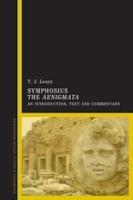
Bloomsbury (2016) h/b h/b pp263 £21.99 (ISBN 9781472511027)
ipsa gravis non sum, sed aquae mihi pondus inhaeret.
viscera tota tument patulis diffusa cavernis
intus lympha latet, sed non se sponte profundit.
What is the solution to this riddle? The answer can be found at the bottom of this review. This is one of Symphosius’ ‘Riddles’, a collection of a hundred three hexameter line verses in the classic riddle form with a solution (or lemma) attached, found in the Latin Anthology. Not much is known about the author or even his dates, but he may have come from North Africa in late antiquity and been attached to a rhetorical school. Leary specialises in this genre of Saturnalian verse consisting of two or three lines perhaps for use as entertainment at parties, and has previously produced editions of Martial’s Xenia and Apophoreta; here he offers a full critical treatment of the text with introduction, text and translation, and detailed commentary.
The riddles are neat and witty and cover a range of topics, rooted in Roman daily life and everyday objects, such as a boot or a fish-hook. Other riddles form groups of animals, small creatures and birds; flowers and vegetables; food items and others. Taken as a whole they give an insight into the kind of things talked about around a Roman dinner table, and Leary’s notes bring out much fascinating information about everyday Roman existence and belief as he explains the assumptions contained in these apparently simple verses. The device of the riddle is to be found in many places in classical literature and Leary traces the origins of some riddles back to Plato or with reference to Homer.
With full philological attention to the transmission of the text and extensive notes on the language of each riddle, this is an exemplary library edition. The level of language competence demanded for the text itself means that these verses are quite accessible for a general reader; teachers looking for suitable material for a class to begin reading authentic texts could well look to this edition as a useful resource, perhaps with some vocabulary help (they lack any of the obscenity associated with some Martial poems). They are also quite fun to read, as long as you cover up the solutions. A sponge is the solution to the riddle above.
John Bulwer
